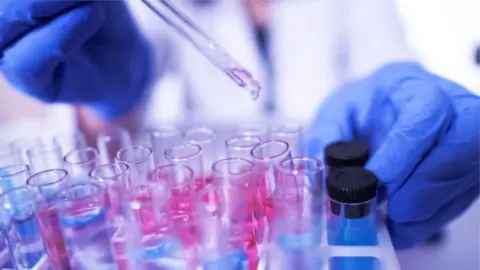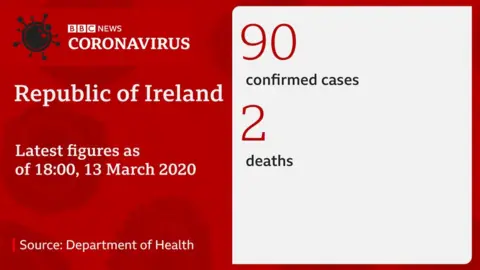Coronavirus: First community transmission cases in NI
 Getty Images
Getty ImagesThe first community transmission cases of coronavirus have been confirmed in Northern Ireland, the Public Health Agency (PHA) has said.
Community transmission means a patient had no known contact with another confirmed case or travelled from a country badly affected by the pandemic.
Three of nine new cases were contracted in this way. The total is now 29.
The health minister has said non-urgent health services are to be reduced in order to care for coronavirus patients.
To date, more than 300 tests for the Covid-19 infection have been carried out in Northern Ireland.

- EASY STEPS: How to keep safe
- A SIMPLE GUIDE: What are the symptoms?
- CONTAINMENT: What it means to self-isolate
- HEALTH MYTHS: The fake advice you should ignore
- MAPS AND CHARTS: Visual guide to the outbreak
- VIDEO: The 20-second hand wash

Of the 29 people who tested positive, 18 are male and 11 are female.
Just five of them are over the age of 60.
The breakdown was outlined in a Belfast City Council meeting by an official who had attended a briefing with Northern Ireland's chief medical officer.
On Friday evening, 20 new cases of Covid-19 were confirmed in the Republic of Ireland, bringing the total number in the state to 90 confirmed cases.
Four of those new cases are healthcare workers who came into contact with people who had already tested positive for the virus.

Health Minister Robin Swann said affected healthcare services that are to be scaled back include non-urgent outpatient appointments, day cases, inpatient and diagnostic work.
The cancellations and postponements will be phased in over the coming days and weeks.
Mr Swann apologised to those whose appointments will be postponed or cancelled but said coronavirus was "the biggest public health challenge for at least a generation".
 Pacemaker
Pacemaker"I want to be totally frank with the public about the scale of the challenge heading our way," Mr Swann said.
"Health services across the globe are coming under severe pressure. Ours is no different.
"We have now started freeing up resources in our health service to provide hospital care for the most seriously ill Covid-19 patients."
Some GP practices have also moved to a telephone triage service, which means patients are asked to call the practice instead of coming without an appointment, according to the Health and Social Care Board (HSCB).
A HSBC spokesperson said GP practices were acting "to protect other vulnerable patients, and minimise potential spread of the virus".
'Not surprising'
First Minister Arlene Foster said the first cases of community transmission were "disappointing but it's not surprising because there has been community transfer in the Republic of Ireland and other parts of the UK for quite some time".
"We know that this is going to spread across Northern Ireland and there will be many, many people who will be victims of Covid-19," she added.
"Some people will not know they have the disease, some people will feel unwell and will have to stay at home and there will be a small number of people who will have to be hospitalised and indeed may even result in fatality."
In a statement, the PHA said that the confirmation of the first community transmission was expected and highlights the importance of new guidance on self-isolation to prevent the spread of coronavirus.
The new guidance states that anyone who displays specific symptoms of Covid-19 must self-isolate for seven days, even if they have not travelled from an affected area.
"The most common symptoms of COVID-19 are a new, continuous cough and/or high temperature," said Dr Jackie Hyland, consultant in health protection at the PHA.
"If you have any of these symptoms, however mild, stay at home and do not leave your house for seven days from when your symptoms started."
Previously, the self-isolation guidelines applied only to people who had travelled from badly affected countries like Italy and those who had been in close contact with a positive case.
The new guidance was issued following the decision to move from the containment phase of the government's response to the delay phase.
Earlier on Friday, the first and deputy first minister disagreed over whether schools, colleges and universities should close because of the outbreak.
Deputy First Minister Michelle O'Neill said they should shut immediately, in line with measures announced in the Republic of Ireland on Thursday.
Her statement came a day after she, along with Mrs Foster, said the executive was not at the stage where Northern Ireland's schools needed to close.
Meanwhile, the ministers are due to meet with tánaiste (Irish deputy PM) Simon Coveney and Irish Health Minister Simon Harris on Saturday.
